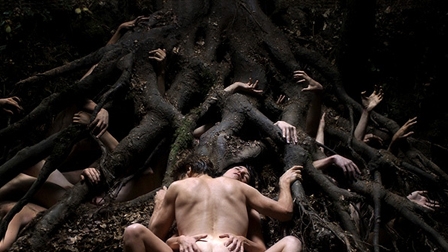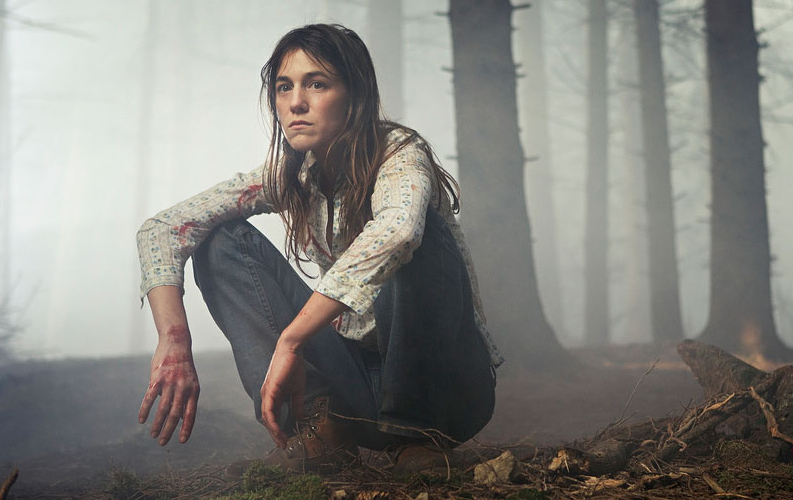
Lars Von Trier: The Man Behind the Madness
I saw “The Element of Crime” when I was about 17. It was one of the first foreign films that I ever attempted to watch without parental encouragement. The experience was befuddling, boring and by the end, thoroughly captivating. I still don’t entirely understand what Lars Von Trier was going for with this watery vision of end times, but I suspect that is probably true for anyone who has seen it. In fact this may be a good way to inform the inexperienced viewer who wants to venture into the Von Trier world. Don’t try to solve every puzzle; your efforts will most likely leave you frustrated and no richer than those who just attach to the material emotionally. That said, there is a lot at work in a Lars Von Trier movie and having someone to watch it with and kick around ideas with afterwards is probably a wise strategy too.
Lars Von Trier has played many different roles during his 25 year career. Early on it was that of the golden child. “The Element of Crime” won him a technical prize at Cannes for its striking color palette and its bold melding of the Noir tradition with a Tarkovsky-esque timbre. The film was the first installment in the “Europa Trilogy” which also featured the roundly panned “Epidemic” and the widely lauded “Europa” (aka “Zentropa”). Nothing in the trilogy could be called easily accessible, but the bookend films in the set are high on style and substance and remain some of his most well received work.
Von Trier is nothing if not an incessant tinkerer where cinema is concerned. After the “Europa Trilogy” he went on to form a production company that would turn out two hit Danish TV series (Kingdom, Kingdom II). Zentropa studios also became the first big name production company to produce films with hardcore pornographic content. Von Trier would go on to help establish the barebones movement known as Dogme’ 95. The Dogme’ 95 school of filmmaking was a response to the bloated budgets of Hollywood, and it prized character and humanity over illusory artifice.
The Dogme’ era would see him produce 3 of his most recognizable titles, “Dancer in the Dark”, “Breaking the Waves”, and “The Idiots” (regarded as his only true Dogme’ 95 film). The films all feature female protagonists and employ handheld camera work and largely unscripted dialog. He would follow these films with his “America” trilogy. The films in this series included “Dogville”, “Manderlay”, and a third as yet unrealized film, tentatively titled “Washington”. This trilogy represents another stylistic shift for Von Trier and the two completed films are perhaps his most overtly political works to date.

With the hullabaloo around his new film “The Antichrist” it appears that he has again struck out into deep waters. The mix of provocative images, idealism, and wild flights of stylistic fancy would seem to be in short supply these days, at least in the American cinematic experience. This is the space Von Trier has inhabited his entire career. For this reason it is possible to hate every single film in his canon while being simultaneously impossible to forget having seen them.
I have a strong love/hate thing with the Lars Von Trier’s work. On one hand, I would swear to you that one of the greatest performances I have ever seen was given by Emily Watson in “Breaking the Waves”. In the next breath I could rant about how anyone who cared about things like suspension of disbelief or entertainment would not be able to sit through “Dogville”. It is part of the allure of following a guy like Lars Von Trier. If you read any of the man’s quotes or interviews you get a sense very quickly that he is still learning on the fly and comfortable with admitting it. This sense of play helps to illuminate what could otherwise be viewed as a catalog of very dark films.
A skilled filmmaker taking chances and acknowledging his process is antithetical to the current trend among Hollywood tastemakers. Most of the drones that are helming cut and paste industry fare are paid handsomely to promote high polish convention. Von Trier on the other hand started his career with examples of bravura visual style and has since moved away from it in favor of rawer more streamlined visuals. This brings us back to “Antichrist”.
Based on the trailer I would say, “Buyer beware”. From that short peek it looks like a pretty standard, even glossy affair. A simple set-up, ominous music and frightened looking characters. If history is any indication the movie won’t deliver on some of what the preview promises. That’s because just when you think you know what Lars Von Trier has up his sleeve he adds a new set of wrinkles to the back of his hand… and sometimes he slaps you across the mouth with it.
On the other hand maybe this is where I am trying too hard to anticipate the unorthodox. Perhaps old Lars has made a reasonably straightforward horror film filled with the refrains of recent extreme cinema offerings like “Martyrs” and “Inside”. I would think it safer to assume that he sets it up this way and then uses his considerable powers of emotional manipulation to transport you to an unfamiliar cinema space with uneven footing and a lot of unanticipated developments, both in story and style. But that is just a guess. What I do hope is that the film challenges and bemuses me, like almost everything else I have seen from him.
If you’ve never seen a Lars Von Trier film, there may be no ‘best’ place to start. For what it is worth I favor “Zentropa” and “Breaking the Waves” over everything else I have seen. “The Kingdom” is his most horror fan friendly work, but it was also made for TV so it doesn’t fully represent his penchant for experimentation. That said, perhaps “The Kingdom” is the easiest point of entry. It features a lot of good dry humor and well honed David Lynch overtones. Whatever you decide to watch, remember not to try too hard to figure everything out in the moment and don’t worry too much if you don’t like everything you are seeing. You aren't necessarily supposed to.

